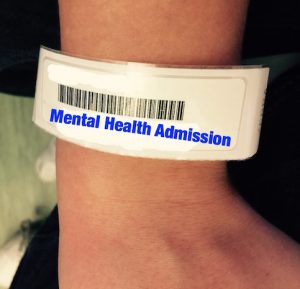 My Nameband. |
Recently, I had to take an unexpected what-I-call Life Hiatus. My mental health had gradually deteriorated to the point were I was having severe and erratic mood swings. Everyone’s mood fluctuates throughout the day, but not to the extremes I was experiencing.
People talk about good and bad days with depression. I was having good, bad, okay or mixed mood states lasting between 45 minutes to 4-6 hours. These mood swings were unpredictable with no pattern. They didn’t have triggers and were not related to a critical inner voice.
These mood swings were torturous. See My Mood Swing Table below for details of what these mood swings were like.
|
I felt desperate for the mood swings to end. To the point of having suicidal ideation and a clear plan of action.
I had thought that I was objective about my mental health. But because the mood swings had gradually got worse I hadn’t realised how unwell I was. I sought help because three people close to me said that I wasn’t well. Luckily I had these people around me and knew that could trust them, even if I couldn’t trust myself.
So I went to my local A&E. I was assessed by a Mental Health Nurse and together we decided that I needed admission. I stayed on the A&E Ward overnight, whilst I waited for an available bed on a mental health ward.
The next evening, I was transferred to a mental health ward. On arrival at the ward, my possessions were searched and Nursing Staff took my shoe laces, belt, hoodie (due to cord in hood), phone charger, lighters and medication. The ward layout was a square shaped main corridor with dormitories, individual rooms and many other rooms that where behind locked doors.
The first night was frightening. Everything about the place was frightening. The environment. The locked doors. The routine. The rules I hadn’t been told. The other patients. The staff. I even found my own mood swings frightening. At one point, I was physically shaking uncontrollably due to the fear and anxiety.
I was assessed by a Psychiatrist and commenced on 10 minute observations. It would be a few days before I was reviewed. At the time, I couldn’t understand why they appeared to be doing very little to help me and my state of mind. But afterwards, I realised that they had wanted to observe me and see my mood swings for themselves.
The Consultant Psychiatrist diagnosed me with a ‘Mood Disorder.’ Here is a definition of a ‘mood disorder:’
mood disorder –
noun
a psychological disorder characterized by the elevation or lowering of a person’s mood, such as depression or bipolar disorder.
(From: Google, Last Accessed: Friday 27th November 2015.)
The Consultant Psychiatrist informed me that they were reluctant to give a more specific diagnosis on the first admission to a mental health ward. I told the Consultant Psychiatrist that I didn’t care what they called it, as long as they gave me some medication that worked. I explained that with some stability in mood, I could make further psychological and behavioural changes to help myself to get well and stay well.
I was started on Quetiapine, an antipsychotic and mood stabiliser medication. It was to help to take the edge off my mood swings and give me some stability of mood. I was also started on Mirtazapine, an antidepressant. This was to help to manage the depression/low moods.
Overall, I was an in-patient on the mental health ward for about 12 days. During this time, my Mum and good friend Steve were superb. They took over all my responsibilities and made sure that everything in the outside world was sorted, meaning that I didn’t have to worry about anything – apart from getting better.
I will never be able to thank Mum and Steve enough for what they have done for me, but I have repeatedly thanked them anyway. I will never be able to explain how much I appreciate them for everything that they have done for me, but I have tried to explain anyway.
I feel that I got to this crisis point because I waited so long to get referred to and assessed by Community Mental Health Services. It feels like Community Mental Health Services are designed to keep people out, rather than let people in to get the help and support that they need and in most cases are asking for. This is probably because of a lack of resources in mental health services. But this really doesn’t help and support people with mental health problems to get and stay well.
I have been discharged from the hospital and am and engaged with Community Mental Health Services. Recovery will be a slow and progressive one. I am taking the medication as prescribed, attending appointments with community services and setting myself daily goals that I am currently achieving.
Write soon,
Antony
|
My Mood Swing Table |
|
Highs |
Okays |
Lows |
Mixed Mood States |
| Physical Symptoms |
- High energy levels.
- Very productive.
- Difficulty in getting/staying asleep.
- Head aches.
- Speaking Quickly.
- Hypersexualised.
|
- Relatively symptom free. Considering the extreme High and Low physical symptoms.
|
- Exhaustion – despite sleeping for many, many hours.
- Back pain and stomach pain that doesn’t resolve with appropriate treatments.
- Head aches.
- Constipation.
- Physical anxiety symptoms: raised pulse and blood pressure.
|
- A mix of high, low and okay physical symptoms to varying degrees of severity.
|
| Mental / Cognitive Symptoms |
- Racing thoughts – lots of ideas, but struggling to focus on one for long enough.
- Difficulty in concentrating.
- A rush of ideas for creative projects.
- Saying whatever I think without considering the implications of what I’m saying.
- Grandiose thinking – Thinking I can do anything to a level beyond the level of an expert.
- Thinking that I understand things on a much deeper level than everyone else.
- Short-term memory loss.
- Insomnia and night terrors.
|
- Slower mental and cognitive functioning, compared to when I was well.
|
- Limited/no concentration span.
- Short-term memory loss.
- Critical inner voice.
- Thoughts about what other people negatively think about me.
- Insomnia and night terrors.
- Concern about loosing my mind.
|
- A mix of high, low and okay mental / cognitive symptoms to varying degrees of severity.
- Concern about loosing my mind.
- Concern about what mood would come next and its severity.
|
| Emotional Symptoms |
- Excessively joyful with no reason for this state of mood.
- Super confident. Loads of self-esteem.
- Excessively excited again without reason.
- Feeling like I can do anything.
- Feeling frustrated or irritable without a reason.
- Varying levels of anxiety, from worried to outright panic.
|
- Void of any emotion.
- Zombified. Feeling like what I imagine a zombie feels like.
- Going through the motions.
|
- Despair and hopelessness.
- No confidence and rockbottom self-esteem.
- Feeling frustrated or irritable without a reason.
- Feeling like I am falling down a dark bottomless pit.
- Feeling guilt, inadequacy and feeling like a failure.
- Varying levels of anxiety, from worried to outright panic.
- Desperation – wanting the mental and emotional anguish to end.
- Feeling like my mind, body and soul are being devoured and destroyed.
|
- A mix of high, low and okay emotional symptoms to varying degrees of severity.
|
| Behavioural Examples |
- Being super productive.
- Being overtly social.
- Take on too many commitments, thinking that I can do everything.
- Impulsive behaviours – including excessive shopping, even when I don’t have the money.
- Unfinished tasks – sometimes being unable to focus for long enough on tasks to complete them.
|
- Able to function, but only just.
|
- Loss of interest in leisure activities.
- Unable to watch TV, read or do other leisure activities.
- Overeating or forcing myself to eat despite having no appetite.
- Poor personal hygiene.
- No motivation.
- Reckless spending of money – mostly through online shopping.
- Social anxiety – isolating myself and avoiding social situations.
|
- A mix of high, low and okay behaviours to varying degrees of severity.
|

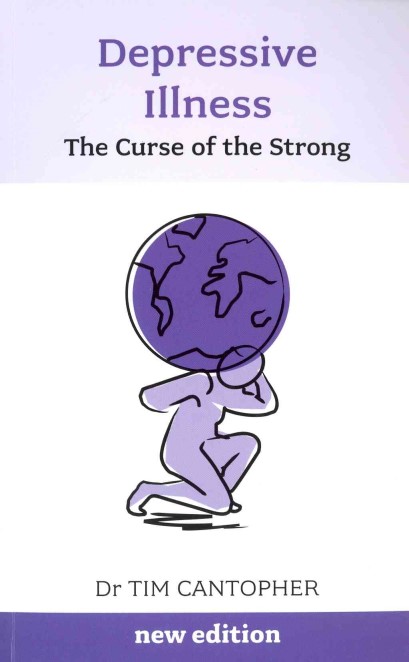




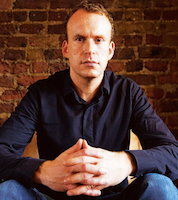
















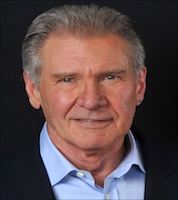





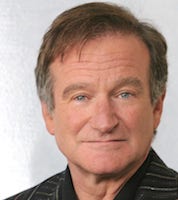






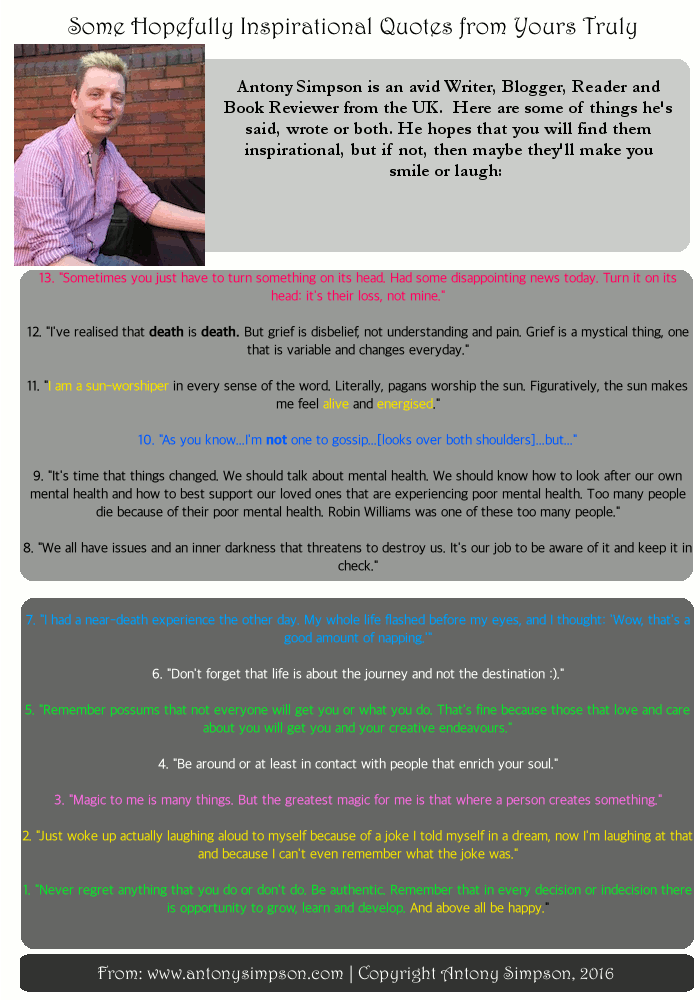


A great introductory article on candle magic :)
Hi Sofia, Thanks for the comment. I bought that in Glastonbury and he was a real find. I bought him…
Hi! I know this was posted ages ago and so a response may be rare but my dad has been…
Hi Ruth, Thanks for the comment. He might well have been. A x
Hi! Watching video and interviews with Charlie Watt, it had me wondering if he might have had Aspergers/ been on…